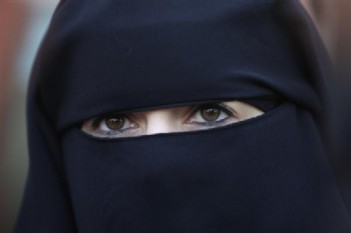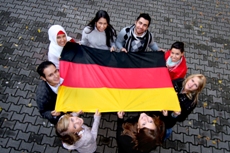GERMANS REJECT CALLS TO BAN MUSLIMS’ NIQAB


Berlin, 10 Safar 1436/3 December 2014 (MINA) – Calls by a politician in the German Chancellor Angela Merkel’s ruling party to impose a nation-wide ban on Islamic niqab, or burqa, has sparked criticism from religious leaders and politicians as “out of proportion”.
“The burka is the least of our problems,” Aiman Mazyek, chairman of Germany’s Central Council of Muslims, told The Bild German newspaper. On Islam quoted by Mi’raj Islamic News Agency (MINA) as reporting on Wednesday (3/12).
“As long as well qualified migrant women cannot get a job just because of a foreign name or appearance, we should tackle integration problems in the right order.”
Mazyek was commenting on the suggestion made last Monday by Julia Klöckner, deputy chief of Chancellor Angela Merkel’s Christian Democratic Union (CDU) in Rhineland-Palatinate.
In her proposal, Klöckner demanded a public ban on the burka, same as the one applied in France.
Speaking to the German daily newspaper Rheinische Post, she said that the burqa “does not stand for religious diversity, but for a degrading image of women.”
Her suggestion was immediately rejected around Germany by politicians and religious leaders.
On his part, Joachim Herrmann, the Bavarian Minister of the Interior from the Christian Social Union (CSU), the Bavarian sister party of the CDU, described Klöckner’s call for a ban on the burka as “out of proportion.”
Similar opinion was expressed by Green Party politician Omid Nouripour.
In an interview with the German newspaper Bild, he argued “the problem is not the women that wear them, but the men that force them to do so.”
“A ban would only lead to these men to not allow their wives to be outside on the street,” Nouripour added.
“That doesn’t help anyone.”
Integration First
Church leaders have also criticized the proposal.
Though the sight of women wearing burka might make some people feel uneasy, “this is no reason to rush into changing the law,” Petra Bosse-Huber, the German Protestant Church’s bishop for foreign relations, was quoted by Deutsche Welle.
Mazyek, the chairman of Germany’s Central Council of Muslims, pointed to integration problems in German as more urgent cause.
He is one of the attendants of national integration conference held on Monday during which chancellor Angela Merkel announced plans to improve education and opportunities for young migrants in Germany.
“First we need to get rid of discrimination,” Mazyek told the Bild.
“Then the burka issue – which is a minor issue anyway – will solve itself.”
Germany has between 3.8 and 4.3 million Muslims, making up some 5 percent of the total 82 million population, according to government-commissioned studies.
Germany has Europe’s second-biggest Muslim population after France, and Islam comes third after Protestant and Catholic Christianity.
The burqa has been the center of fierce debate since France banned the wearing in public places.
In February 2011, the west-central state of Hesse became the first in Germany to ban the wearing of burqa (face-veil) in public places.
Several European countries such as Spain and Belgium are mulling similar moves.
While hijab is an obligatory code of dress for Muslim women, the majority of Muslim scholars agree that a woman is not obliged to wear the face veil.
Scholars believe it is up to women to decide whether to take on the veil or burqa, a loose outfit covering the whole body from head to toe and wore by some Muslim women. (T/P011/R03)
Mi’raj Islamic News Agency (MINA)






